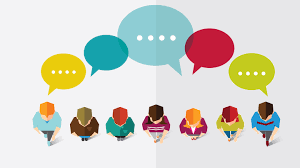What our students think...

Sustainability is very important for our world and many people don't realize it and don't pay a lot of attention to it. The first step is to motivate other people and give them more information about sustainability. The second step would be to think about ways to improve our lifestyle and make the world a lot greener. But most importantly is to look at yourself and ask yourself the question: are you sustainable? I think that starting with small things could already change a lot. For example we could: go to school by bike or by public transport, recycle, eat less meat, plant our own vegetables, be plastic free, water wise, donate used clothes to people or second-hand stores so that they won’t be destroyed as “useless stuff” and other people could still use them. What I would also love to do is going to other classes to speak about sustainability. It would be interesting to share ideas and tips. (Diya)
I am very happy to join the Erasmus+ projects “Lingua Verde” because I think it is a great opportunity for us. By participating in this project we get the chance to learn more about sustainability: what it really means and why it is so important. We also get the opportunity to work together to find possible solutions and to make other people aware of the climate problems. I would like to learn about the climate issues in Italy and Greece, what they do to deal with them and how people react to it. I would be happy to find ways to solve the problem together. It is a great opportunity to get in touch with new people/students and their view on the world. I am very motivated for this project and I look forward to take action for a better and more sustainable world. (Lucas)
We do a lot of things that damage the earth and lead to climate change like going to school by car every morning, travelling to short destinations by plane, buying too many cheap clothes and other products. I think it’s important to enjoy the things that we do without destroying the earth and damaging the lives of future generations. By making a small change in your life you can make a big difference. If we all make these small changes we can ensure that the future generations can live life as good as we do. This project is a good chance to help people around us understand how important is to fight climate change. (Sofie)
I like the idea of working together with people from other countries, because I’m curious to know about their lifestyle. I would first ask the Italian and Greek pupils how their routine at school is. What transport they use, public transport, walking and how that goes. I would also like to know what they do in winter when it rains and it’s cold and how they spend the summer days when it’s hot. What everyone usually does to deal with climate change, what their solutions are and then maybe we can exchange all our ideas, make a list of pros and cons and make something good out of it for our planet. (Aurelie)
Avec notre classe 4MT , on a eu une semaine super intéressante qui est en lien avec notre projet Erasmus+ Lingua Verde. Elle a commencé mardi quand nous sommes allés voir l’école Miniemeninstituut à Louvain où il y avait des élèves qui venaient d’Italie. Ils faisaient aussi un projet Erasmus+, non pas avec notre école, mais avec les élèves du Miniemeninstituut, mais on a pu participer ! Le but était que nous puissions collaborer avec eux pendant des expériences. On devait ainsi laver les bancs dans la cour de récré pour nous montrer après comment il fallait faire pour récupérer l’eau et la purifier afin qu’elle soit de nouveau propre. Ceci est assez pratique car ainsi on doit moins utiliser l’eau des robinets ! Le lendemain, nous sommes allés à la bibliothèque de Leuven où Koen Meirlean (un enseignant de géographie dans une école à Deinze) nous a expliqué son site web ‘So Get Informed’ où l’on peut voir ce que les gens font contre le réchauffement climatique et les diverses solutions proposées. Il nous a aussi expliqué ce qu’il a fait quand il est allé en Antarctique pour y étudier les conséquences du réchauffement climatique, ce qui était fort intéressant ! Jeudi, nous sommes allés au Parlement Européen où une personne nous a expliqué comment ce Parlement fonctionne et à quoi ça sert. Toutes ces activités nous ont appris différentes choses sur le réchauffement climatique en particulier, les problèmes causés par ceci mais aussi, de nouveau, les éventuelles solutions et mesures proposées par le Parlement. Cette semaine-ci, on a appris qu’on n’est pas les seuls à nous soucier de ce problème urgent mais qu’on peut tous réagir! (Loïse)


